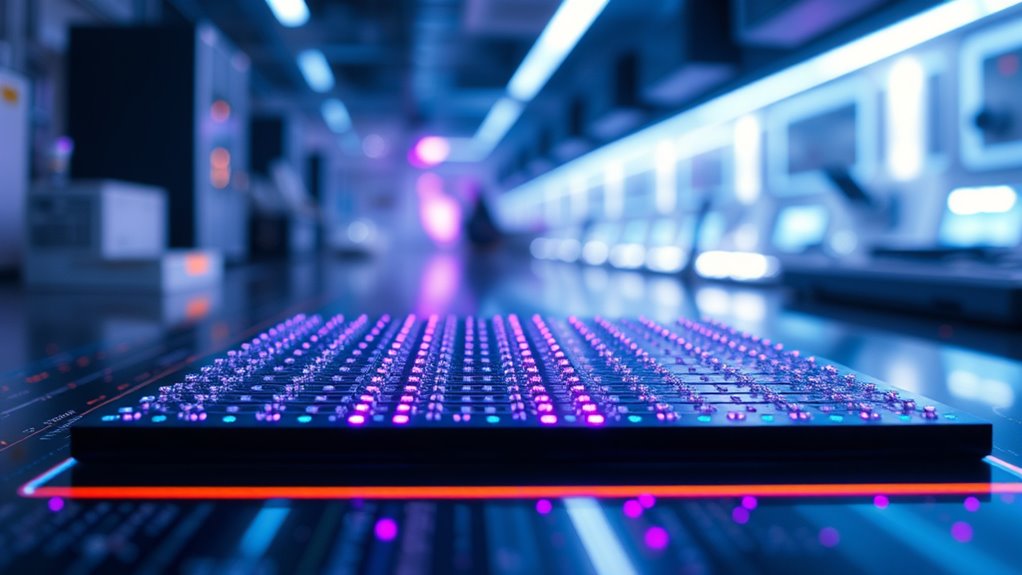Qubits are different from classical bits because they use principles of quantum mechanics like superposition and entanglement. This means, unlike bits that are either 0 or 1, qubits can exist in multiple states at once, allowing quantum computers to process many possibilities simultaneously. Entanglement links qubits so their states are connected, boosting computational power. Keep exploring to uncover how these properties push the limits of what technology can do.
Key Takeaways
- Qubits can exist in superpositions, representing both 0 and 1 simultaneously, unlike classical bits, which are either 0 or 1.
- Entanglement links qubits so their states are interconnected, enabling complex quantum computations beyond classical capabilities.
- Quantum algorithms leverage superposition and entanglement to explore multiple solutions at once, increasing processing speed.
- Qubits are highly sensitive to environmental noise, requiring advanced error correction to maintain stability.
- The fragile nature of qubits and the need for error correction differentiate quantum systems from classical computing hardware.

Have you ever wondered how quantum computers can solve problems that traditional computers find impossible? The secret lies in how qubits—the basic units of quantum information—operate differently from classic bits. Unlike bits, which are either 0 or 1, qubits can exist in a superposition of both states simultaneously. This unique property allows quantum computers to process a vast number of possibilities at once, vastly speeding up certain calculations. But what really sets qubits apart are their entanglement properties and the sophisticated error correction techniques used to maintain their delicate states. Quantum algorithms leverage these properties to outperform classical algorithms in specific tasks.
Entanglement is a phenomenon where the states of two or more qubits become linked so that the state of one instantly influences the state of the other, regardless of distance. This interconnection enables quantum computers to perform complex operations more efficiently than classical systems. When qubits are entangled, they don’t act independently; instead, their combined state carries information that would require exponentially more bits to replicate in a classical system. This property is fundamental to many quantum algorithms, allowing them to explore multiple solutions simultaneously and arrive at the correct answer faster.
However, qubits are inherently fragile. Their quantum states are highly susceptible to disturbance from environmental noise, which can cause errors in calculations. That’s where error correction techniques come into play. Unlike classical error correction, which simply repeats bits or uses parity checks, quantum error correction involves encoding a single qubit’s information across multiple physical qubits. These methods help detect and correct errors without measuring and collapsing the qubits’ states, preserving the quantum information’s integrity. Implementing effective error correction is a critical challenge in building reliable quantum computers because it demands creating and managing large numbers of physical qubits to protect the logical qubits that perform computations.
Understanding these properties gives you insight into why quantum computing is so powerful yet so complex. The entanglement properties enable a level of interconnectedness that classical bits simply cannot achieve, while error correction techniques ensure that the fragile quantum information remains intact long enough to perform meaningful calculations. Together, these aspects drive the ongoing development of quantum hardware and algorithms. As researchers continue to refine these techniques, quantum computers will become more practical, opening doors to solving problems that are currently beyond reach for traditional machines. So, the next time you hear about quantum breakthroughs, remember that it’s these unique quantum features—entanglement and error correction—that make all the difference.
Frequently Asked Questions
How Do Qubits Maintain Coherence Over Time?
You might wonder how qubits keep their coherence over time. They do this by minimizing quantum decoherence, which disrupts their delicate states. Researchers use error correction techniques to detect and fix errors caused by environmental noise. By isolating qubits from external disturbances and implementing advanced error correction, you can extend their coherence time, ensuring more reliable quantum computations. This ongoing effort is key to practical quantum computing.
What Are the Main Challenges in Building Scalable Quantum Computers?
Building scalable quantum computers faces major challenges like error correction and hardware scalability. You need to develop methods that detect and fix errors without collapsing qubit states, ensuring reliable computation. Additionally, expanding the hardware while maintaining qubit coherence and minimizing noise is tough. As you address these issues, you’ll bring closer the goal of practical, large-scale quantum systems capable of solving complex problems beyond classical computers.
How Does Quantum Entanglement Affect Qubit Interactions?
Imagine qubits dancing in a cosmic web, their fates intertwined through quantum entanglement. This connection allows you to perform quantum teleportation and entanglement swapping, enabling instant state sharing regardless of distance. When you manipulate one qubit, its partner responds instantly, creating a web of correlations that enhances quantum computing’s power. Entanglement shapes how qubits interact, revealing new possibilities in secure communication and complex problem-solving.
Can Classical Computers Simulate Quantum Algorithms Efficiently?
You might wonder if classical computers can efficiently simulate quantum algorithms. Due to classical limitations and simulation constraints, they struggle with this task. Quantum algorithms leverage superposition and entanglement, making simulations exponentially harder for classical systems. While some approximations are possible, accurately replicating quantum behavior remains challenging. So, in many cases, classical computers can’t efficiently simulate complex quantum algorithms, highlighting the unique power of quantum computing.
What Industries Stand to Benefit Most From Quantum Computing Advancements?
Ever wondered which industries will reap the biggest benefits from quantum breakthroughs? You’ll find that cryptography security and drug discovery stand to gain immensely. Quantum computing can crack complex encryption faster and simulate molecules at an atomic level, accelerating new drug development. As these industries evolve, you’ll see safer digital systems and life-saving medicines, transforming everyday life and global health. Are you ready for this technological revolution?
Conclusion
Now that you understand the incredible power of qubits, you realize they’re not just tiny bits of data—they’re the superheroes of the tech world, capable of transforming everything we know about computing. With their ability to exist in multiple states at once, you’re on the brink of a revolution that could make today’s computers look like stone tablets. Get ready, because the future of technology is about to be rewritten by these mind-boggling quantum marvels!










